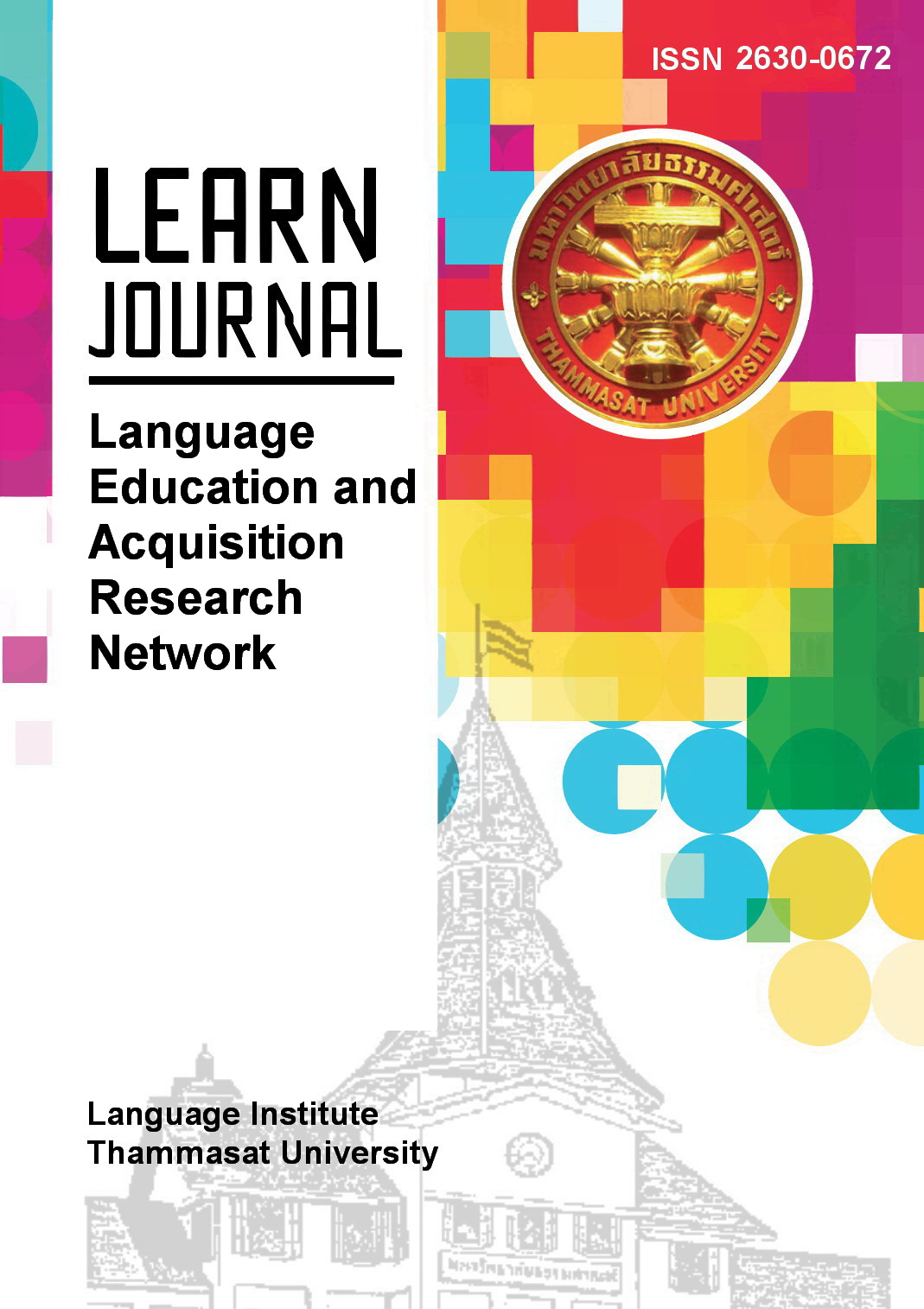A Case Study of an Interplay of an In-Service Teacher’s Possible Selves in His Professional Development
Main Article Content
Abstract
Professional development is a vital process enhancing in-service teachers’ professional qualities. This case study investigated an in-service teacher’s possible selves and factors influencing his professional development. The participant was a project-based teacher in a constructionism school in Bangkok, Thailand. He was selected as the subject for this study due to the rich data he shared with the researchers in a larger-scale research study. Semi-structured interviews and personal diaries were the main instruments employed to reveal his possible selves, goals, and investment in the professional developmental process. An interplay of possible selves and the factors involved were analyzed and presented using narrative inquiry techniques. The findings revealed that the teacher invested heavily in the professional development process to improve his project-based learning pedagogy and English proficiency. The congruence of his ideal and ought-to selves, his clear goal, and his positive attitudes toward professional development were clearly observed. This clearly influenced his investment in professional development. Implications and suggestions for the teacher’s professional development and future research were discussed.
Article Details
References
Agbenyega, J. S., & Klibthong, S. (2021). Exploring Thai early childhood teachers’ experiences of inclusive teaching practices: A qualitative study. The Australian Educational Researcher, 48(1), 125–143. https://doi.org/10.1007/s13384-020-00380-1
Alamri, W. A. (2019). Effectiveness of qualitative research methods: Interviews and diaries. International Journal of English and Cultural Studies, 2(1), 65-70. https://doi.org/10.11114/ijecs.v2i1.4302
Alpsoy, C., & Türkdoğan, D. (2017). EFL teachers’ perceptions of professional development. Edu 7: Yeditepe Üniversitesi Eğitim Fakültesi Dergisi, 6(8), 80-93.
Alzahrani, M. A., & Nor, F. M. (2021). ELF Teachers' Attitudes towards Professional Development Programs. International Journal of Education and Practice, 9(4), 729-739.
Avalos, B. (2011). Teacher professional development in teaching and teacher education over ten years. Teaching and Teacher Education, 27(1),
-20. https://doi.org/10.1016/j.tate.2010.08.007
Bayar, A. (2014). The components of effective professional development activities in terms of teachers’ perspective. International Online Journal of Educational Sciences, 6(2), 319-327.
https://doi.org/10.15345/iojes.2014.02.006
Birman, B. F., Desimone, L., Porter, A. C., & Garet, M. S. (2000). Designing professional development that works. Educational Leadership, 57(8), 28-33.
Clandinin, D. J., & Caine, V. (2008). Narrative inquiry. In L. M. Given (Ed.), The Sage encyclopedia of qualitative research methods (pp. 541-544). Sage Publications.
Clarke, A. (2023). Teacher inquiry: By any other name. In R. J. Tierney, F. Rizvi & K. Ercikan (Eds.), International Encyclopedia of Education (4th ed.). Elsevier.
Desimone, L. M. (2011). A primer on effective professional development. Phi Delta Kappan, 92(6), 68-71. https://doi.org/10.1177/003172171109200616
Dörnyei, Z. & Ushioda, E. (2011). Teaching and researching motivation (2nd ed.). Pearson.
Hamman, D., Coward, F., Johnson, L., Lambert, M., Zhou, L., & Indiatsi, J. (2013). Teacher possible selves: How thinking about the future contributes to the formation of professional identity. Self and Identity, 12(3), 307-336. https://doi.org/10.1080/15298868.2012.671955
Hamman, D., Gosselin, K., Romano, J., & Bunuan, R. (2010). Using possible-selves theory to understand the identity development of new teachers. Teaching and Teacher Education, 26(7), 1349-1361. https://doi.org/10.1016/j.tate.2010.03.005
Hiver, P. (2013). The interplay of possible language teacher selves in professional development choices. Language Teaching Research, 17(2), 210-227. https://doi.org/10.1177/1362168813475944
Kennedy, M. M., (2016). How does professional development improve teaching?. Review of educational research, 86(4), 945-980.
Kubanyiova, M. (2009). Possible Selves in Language Teacher Development. In Z. Dörnyei & E. Ushioda (Eds.), Motivation, language identity and the L2 self (pp. 314-332). Multilingual Matters.
Kumazawa, M. (2013). Gaps too large: Four novice EFL teachers' self-concept and motivation. Teaching and Teacher Education, 33, 45-55. https://doi.org/10.1016/j.tate.2013.02.005
Noonan, J. (2019). An affinity for learning: Teacher identity and powerful professional development. Journal of Teacher Education, 70(5), 526-537.
Ovalle Quiroz, M., & González, A. (2023). Imagined identities and imagined communities: Colombian English teachers’ investment in their professional development. Profile: Issues in Teachers' Professional Development, 25(1), 213-228. https://doi.org/10.15446/profile.v25n1.99248
Oyserman, D., Bybee, D., Terry, K., & Hart-Johnson, T. (2004). Possible selves as roadmaps. Journal of Research in Personality, 38(2), 130-149. https://doi.org/10.1016/s0092-6566(03)00057-6
Powell, C. G., & Bodur, Y. (2019). Teachers’ perceptions of an online professional development experience: Implications for a design and implementation framework. Teaching and Teacher Education, 77, 19-30. https://doi.org/10.1016/j.tate.2018.09.004
Ribas, F. C. (2013). The motivation of EFL public school teachers: What can self-theories tell us? Revista Horizontes de Linguistica Aplicada, 11(2). https://doi.org/10.26512/rhla.v11i2.1191
Ruan, X., & Toom, A. (2022). Exploring female EFL teachers’ professional agency for their sustainable career development in China: A self-discrepancy theory perspective. Frontiers in Psychology, 13. https://doi.org/10.3389/fpsyg.2022.906727
Ruan, X., Zheng, X., & Toom, A. (2020). From perceived discrepancies to intentional efforts: Understanding English department teachers’ agency in classroom instruction in a changing curricular landscape. Teaching and Teacher Education, 92. https://doi.org/10.1016/j.tate.2020.103074
Steyn, G. M. (2010). Educators' perceptions of continuing professional development for teachers in South Africa: A qualitative study. Africa Education Review, 7(1), 156-179. https://doi.org/10.1080/18146627.2010.490009
Taddese, E. T., & Rao, C. (2022). School-based continuous professional development of teachers: a case study of primary school teachers in Ethiopia. Education 3-13, 50(8), 1059-1071. https://doi.org/10.1080/03004279.2021.1929382
Truong, M. T., & Murray, J. (2019). Understanding language teacher motivation in online professional development: A study of Vietnamese EFL teachers. Tesl-Ej, 23(3), 1-22.
Ulla, M. B., & Winitkun, D. (2018). In-service teacher training program in Thailand: Teachers' beliefs, needs, and challenges. Pertanika Journal of Social Sciences & Humanities, 26(3). 1579-1594.
Willig, C. (2013). Introducing qualitative research in psychology (2nd ed.). Open University Press
Yuan, R. (2020). Novice nontraditional teacher educators’ identity (re) construction in higher education: A Hong Kong perspective. International Journal of Educational Research, 99, 1-11. https://doi.org/10.1016/j.ijer.2019.101508


